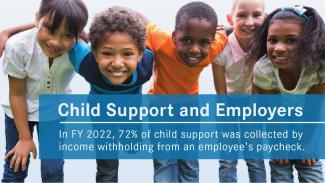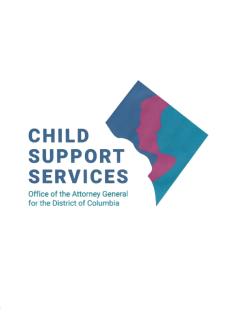Employers

The Role of Employers in Child Support
Employers play a critical role in ensuring that the proper financial and medical support reaches children. The following areas represent important ways that employers participate in the child support process.
Important Information for Employers
Wage (Income) Withholding Orders
CSSD is required to issue an Order/Notice to Withhold in every case in which there is a child support order and there is a known employer for the parent who is ordered to pay support. An employer will be notified of the need to withhold a portion of a parent's wages in each of the following situations:
- Within 2 days of the entry of a new support order or an order modification, if the employer is already known by CSSD
- When the paying parent changes employment and the new employer’s address becomes known
- If applicable, when the paying parent is located and an employer for that parent becomes known
Employers are required by law to follow these instructions to implement wage withholding orders from child support agencies. More information about wage withholding is available to employers.
Making Payments
Employers may submit child support payments electronically through the CSSD secure website. Employers may consult the User Guide for Electronic Child Support Payments for information regarding the formats and procedures for sending payments electronically.
Employers also can send child support payments through the mail as follows:
- Make each money order or check payable to the “District of Columbia (DC) Child Support Clearinghouse.”
- Type, write clearly, or print all information.
- Put the employee’s name, case number, and Social Security number on each money order or check.
- Mail each employer-submitted payment to:
DC Child Support Clearinghouse
PO Box 37868
Washington, DC 20013-7868
National Medical Support Notice (NMSN)
As of October 1, 2001, use of the National Medical Support Notice (NMSN) went into effect. The NMSN is a standardized federal form that all state child support agencies must use in meeting medical support requirements. The form was developed with input from employer groups and health plan administrators. Of additional interest to employers, the NMSN complies with section 609(a)(3) and (4) of ERISA, which pertains to informational requirements and restrictions against requiring new types or forms of employer-provided benefits. Instructions are available for employers that receive a NMSN.
DC New Hire Reporting
The Personal Responsibility and Work Opportunity Reconciliation Act (PRWORA) requires all employers to report newly hired and re-hired employees to a state directory within 20 days of each employee's hire or re-hire date. Employers are to report DC employees to the District of Columbia Directory of New Hires, using the contact information below:
District of Columbia Directory of New Hires
P.O. Box 366
Holbrook, MA 02343
Phone: (877) 846-9523 Ext. 300
Email: contact@dc-newhire.com
Website: https://dcnewhire.com/
Additional information is available for employers regarding the reporting of new hires.

Child Support and Employers
Employers help ensure children get the support they need by working cooperatively with the child support program.
Learn more about the employer role nationwide: https://bit.ly/3nvJi06 #Support4Families






